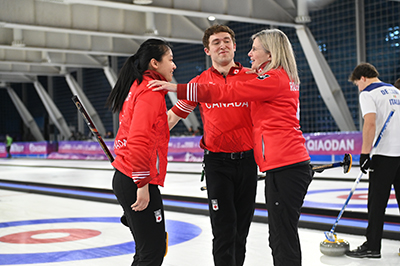Build Coaching Confidence!

Women coaches don’t need permission to coach — just a willingness to start
By: Women in Curling
Confidence is key to becoming an effective curling coach, but it doesn’t always show up before you take the first step. In coaching, especially for women in curling, confidence is often built over time – with experience, community, and support.
Whether you’re thinking about taking on a team for the first time or have years of experience, confidence is a skill you can strengthen – like strategy, communication, or technique.
Here are a few ways to grow your confidence as a curling coach, with insights from recent discussions in our Coaching with Confidence series organized by Women in Curling.
Focus on your coaching context
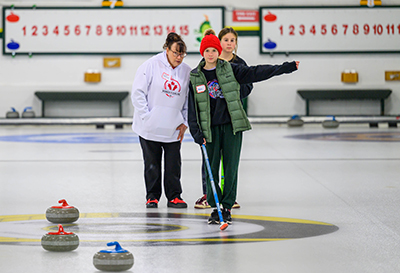
You don’t need to coach at the elite level to be a great coach. One of the biggest confidence barriers for women is the belief that they need a lot of experience to lead. Instead, consider that the key to being a great coach is to focus on your athletes’ needs – whether they’re just starting in a Girls Rock program or competing nationally.
Confidence isn’t a personality type. It’s a decision to trust what you know while you keep learning more.
Jennifer Ferris, sport safety and education officer at Curling Canada, reminds coaches that mastery is relative. You just need to be prepared to guide the people in front of you.
“You don’t have to be a master at the Scotties or Olympic Trials level if you plan to coach at the little rock or senior club level,” said Ferris. “You just need to be more competent than the little rocks at your club.”
Let that line be your permission slip.
Instead of comparing yourself to national-level coaches, think about what your athletes need from you now. Are you giving them structure? Encouragement? Technical feedback? Confidence comes from realizing you already have value to offer.
Practical tip: Match your preparation to the level you’re coaching. Know the rules, bring a plan, and aim to give each athlete one thing they can improve on every session.
Experience builds belief
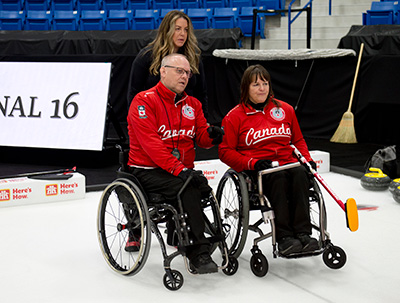
Confidence and experience go hand-in-hand. Many women wait to feel confident before stepping into a coaching role, but confidence often shows up after you start.
In a national survey from Curling Canada, men were more than twice as likely as women to say they felt ready to coach immediately after certification. “Forty-five percent of males felt that they could go off and just coach right away, without needing any additional assistance,” Ferris said. “Whereas only 22% of females felt that they could coach readily after that same training.”
Not because women weren’t prepared—but because they didn’t feel like they had permission.
It’s time to let that go.
The skills you need – clear communication, making decisions, reading the game – only improve when you’re doing them. The more reps you get, the more natural coaching will feel.
Whether you’re coaching Little Rockers or seniors, elite juniors or club teams, your players need someone who shows up with care, direction, and belief. Not perfection.
Practical tip: Start by coaching one drill, one practice, or one game. Small reps add up and give you the foundation to lead more sessions confidently.
Find your coaching voice
Confidence doesn’t mean copying someone else’s style. The best coaches lead in ways that reflect who they are – whether that’s calm and methodical or high-energy and vocal. Knowing your strengths helps you coach with clarity and consistency.
Still unsure where to start?
Start small. Start local. Start with what you already know. Ask for support. Find a mentor. Go to a practice. Show up.
And when the doubt creeps in—because it always does—Ferris suggests grounding yourself in something you already have: your values and your lived experience.
“What do people admire about you?” she asked. “What are the good things that have been said to you?” Use that feedback to shape your voice. If your friends say you make them feel calm, build on that. If teammates say you’re great at breaking things down, use it. You don’t need to change who you are to be seen as a leader.
Those answers are your foundation—the things your players already see. The energy you bring that can’t be measured by wins alone.
Practical tip: Write down three strengths others have mentioned about you – then think about how each one can show up in your coaching approach.
Connection is a coaching tool
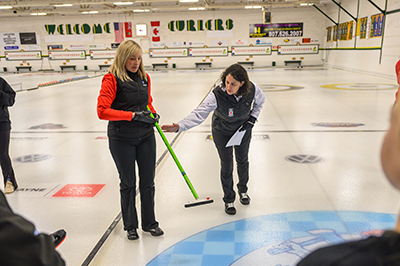
Confidence grows faster when you’re not building it alone. That’s why mentorship and in-person experience matter. It’s not just about learning theory; it’s about trying things out, seeing what works, and getting real-time feedback.
Formal training—such as NCCP programs—matters. So do informal ones. Attend a camp. Shadow a coach. Join a group. Try something before you’re totally “ready”, because that’s what builds readiness.
“It’s unrealistic to think we can train coaches through a computer,” Ferris said. “Coaching is a hands-on skill.” Whether through a formal mentorship program or a fellow coach at your club, find someone who can offer input and help you troubleshoot. You don’t need all the answers – you need a community that helps you keep asking good questions.
Kim Forge, who serves as Vice President of World Curling, spoke powerfully to the ripple effect that comes when women claim their space behind the bench.
“Young female athletes who see women in coaching roles are far more likely to believe they can stay in the sport longer than just their playing careers,” she said. “When women coach at the highest levels, it changes the narrative of what leadership in sport looks like.”
You’re not just coaching a team. You’re building a picture of what leadership can look like.
Which means you won’t figure it all out before you begin. You’ll figure it out by beginning.
There’s no single way to be a great coach. But there is one thing that every confident coach has in common: they showed up before they had it all figured out.
Practical tip: After your next practice or game, ask another coach, “What’s one thing you saw that worked – and one thing I could tweak?” Also, to find like-minded women who are here to support you, get connected with Women In Curling through our Facebook group for updates on upcoming events.
Confidence doesn’t always come first, but it always grows through action
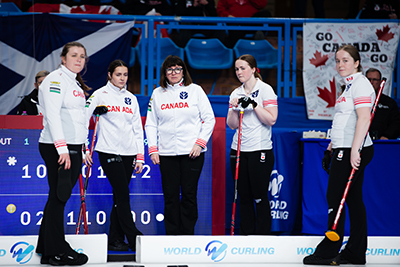
Start where you are. Lead as only you can. Your impact matters – especially in moments when confidence hasn’t fully arrived.
That message comes through loud and clear when you listen to women such as Ferris, Forge and Laura Leitch —leaders and coaches who understand that confidence in coaching isn’t something you’re born with. It’s something you build.
“Confidence is a really important mental skill,” Ferris said early in Curling Canada’s Coaching with Confidence webinar. “It is tied directly to self-esteem and self-regard, but it’s also tied to skills, knowledge and personal accomplishments.”
In other words, confidence doesn’t just show up one day. It comes from doing the thing. From getting in the room. From being willing to learn out loud and take up space before you feel 100% ready.
And yet—so many women don’t.
So if you’re a woman thinking about coaching—or one who already is but still battles that inner critic—let this be your push.
You don’t need permission. You don’t need perfection. You just need to start.
Because, as Forge reminded the group:
“Women leadership and coaching isn’t just beneficial—it’s necessary. The future of our sport needs you.”
And the next confident coach might be reading this right now.





